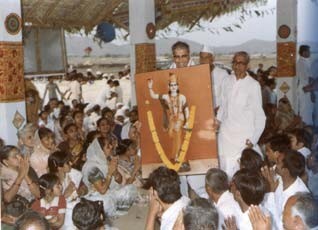The Life Oriented Philosophy...
Swadhyay began its journey in the early 1940s when Revered Dadaji (Pandurang Shastri Athavale), a young scholar then in his early twenties, began to deliver discourses in the Shreemad Bhagwad Geeta Pathshala in Mumbai, India.
Swadhyay is a Sanskrit word meaning self-study, but it is more than merely a "study". The word movement is an incomplete description of what Swadhyay is and what it does; rather, it is a tribute to Rev. Dadaji, who has founded it, nurtured it, and inspired millions of people to join the Swadhyay stream. He has single-handedly spearheaded a silent revolution which aims at the social and cultural transformation of man.

A process of self-transformation and self-empowerment, for Swadhyayees it is a life-changing experience, an experience that gives dignity, self-respect, and self-esteem to the individual. It is a network of interacting individuals and communities. They may have different identities and orientations, yet they come together to share a system of beliefs and a sense of belonging. Such integration facilitates community regeneration and healing at both the individual and social levels. The primary goal of Swadhyay is to develop an awareness of the indwelling God -- the divine presence within every human being. Another basic idea of Swadhyay is that bhakti (devotion) is not strictly an introverted activity; rather, it is also a social force. Bhakti is at the foundation of Swadhyay'. Bhakti is an understanding of man's relationship with the Divine and with others. But for bhakti to be a social force and move beyond ritualism, temple worship, scriptural learning and attending religious discourses, it would have to be transformed into selfless and righteous action based on devotion. Self-perfection sublimated through constructive work for a collective good is seen as kruti-bhakti (devotional activism), which fosters a universal brotherhood under the fatherhood of God.
In Swadhyay, the sacred becomes more personal while satisfying individual and community needs. These are not simply material needs; rather, they are basic human needs like love, identity, self-acceptance, and self-esteem. Though Swadhyay is an inwardly focused spirituality, it is life-oriented.